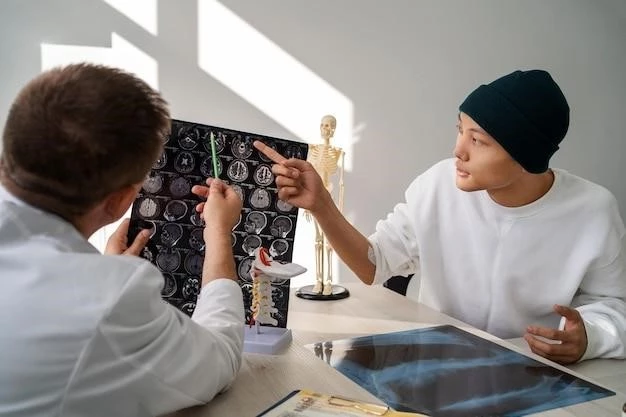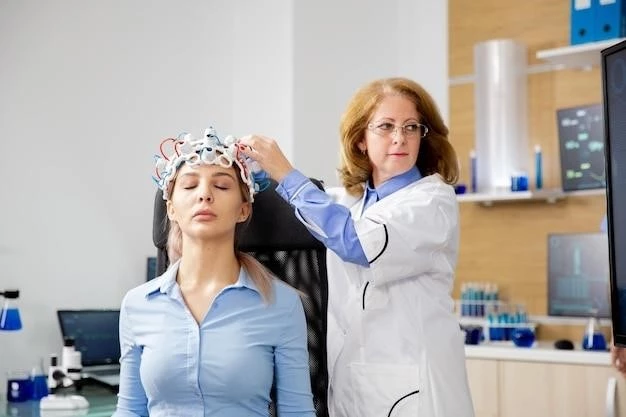Understanding Benign Myoclonic Epilepsy
Exploring the multifaceted aspects of Benign Myoclonic Epilepsy is crucial for comprehensive understanding․ From recognizing symptoms to diagnosing the condition, as well as staying updated on research developments, this article aims to provide a holistic view to help individuals and caregivers navigate this condition effectively․
Symptoms of Benign Myoclonic Epilepsy
Recognizing the symptoms of Benign Myoclonic Epilepsy is vital for early intervention․ Common signs include sudden brief muscle jerks, usually in the arms or shoulders, that may occur multiple times a day․ These jerks are typically bilateral and are not associated with loss of consciousness․ Individuals may also experience brief episodes of staring or altered consciousness․

If you or a loved one are experiencing these symptoms, it is essential to consult a healthcare professional for a thorough evaluation and accurate diagnosis․ Keep a detailed record of the frequency, duration, and nature of the episodes to provide valuable information to the healthcare provider․
Remember, early identification of symptoms can lead to timely treatment and better management of Benign Myoclonic Epilepsy․ Do not hesitate to seek medical advice and support to address any concerns or uncertainties regarding your symptoms․
Treatment Options for Benign Myoclonic Epilepsy
When it comes to managing Benign Myoclonic Epilepsy, treatment options focus on controlling seizures and improving quality of life․ The most common approach is medication, with antiepileptic drugs prescribed to help reduce the frequency and intensity of myoclonic jerks․
It is essential to work closely with a neurologist to find the right medication and dosage that suit your individual needs․ Regular follow-ups are crucial to monitor the effectiveness of the treatment and make any necessary adjustments․
In addition to medication, other treatment options may include lifestyle modifications and stress management techniques․ Regular exercise, adequate sleep, and stress reduction activities can support overall well-being and potentially reduce seizure triggers․
Exploring complementary therapies such as yoga, meditation, or biofeedback may also complement traditional treatment approaches and contribute to a holistic management plan․
Remember, every individual may respond differently to treatments, so open communication with your healthcare team is key to finding the most effective approach for your specific situation․ Stay proactive in your treatment plan and don’t hesitate to discuss any concerns or questions you may have about managing Benign Myoclonic Epilepsy․
Lifestyle Tips for Managing Benign Myoclonic Epilepsy
Adopting a healthy lifestyle can play a significant role in managing Benign Myoclonic Epilepsy and improving overall well-being․ Here are some lifestyle tips to help you navigate life with this condition⁚
- Establish a Routine⁚ Creating a daily routine can help regulate sleep patterns and reduce stress, potentially minimizing seizure triggers․
- Maintain Good Sleep Habits⁚ Adequate and consistent sleep is crucial․ Aim for 7-9 hours of quality sleep each night to support brain health and seizure control․
- Stay Active⁚ Regular physical activity, such as walking, swimming, or yoga, can not only boost mood and overall health but may also help in managing stress levels․
- Manage Stress⁚ Practice relaxation techniques like deep breathing, meditation, or mindfulness to reduce stress, which can act as a seizure trigger․
- Healthy Diet⁚ Eating a balanced diet rich in fruits, vegetables, whole grains, and lean proteins can contribute to overall well-being․ Avoid potential seizure triggers like excessive caffeine or alcohol․
- Stay Hydrated⁚ Remember to drink an adequate amount of water throughout the day to maintain hydration, which is crucial for overall health․
- Open Communication⁚ Keep open communication with your healthcare team, family, and friends about your condition․ This support network can provide emotional support and assistance when needed․
- Regular Medical Check-ups⁚ Stay consistent with medical appointments and follow-ups to monitor your condition and the effectiveness of treatment․
Remember, incorporating these lifestyle tips into your daily routine can empower you in managing Benign Myoclonic Epilepsy effectively and improving your quality of life․ Always consult with healthcare professionals for personalized advice tailored to your specific needs․
Benign Myoclonic Epilepsy in Children
Understanding Benign Myoclonic Epilepsy in children is crucial for parents and caregivers to provide optimal support and care․ This form of epilepsy typically manifests in childhood or adolescence, with symptoms including brief muscle jerks and episodes of altered or staring consciousness․
If your child is diagnosed with Benign Myoclonic Epilepsy, here are some key points to consider⁚
- Educate Yourself⁚ Learn about the condition, its symptoms, and triggers to better understand how to manage your child’s epilepsy․
- Communicate with School⁚ Inform your child’s school about their condition, medication requirements, and any specific needs to create a supportive environment․
- Follow Treatment Plans⁚ Ensure your child takes their prescribed medication regularly and attends follow-up appointments with healthcare providers․
- Establish Routine⁚ Create a stable routine that includes regular sleep patterns, healthy meals, and appropriate physical activity․
- Monitor and Record⁚ Keep a journal of your child’s seizures, including frequency, duration, and any potential triggers, to help healthcare providers assess the effectiveness of treatment․
- Encourage Open Communication⁚ Foster open discussions with your child about their condition, treatment, and any concerns they may have․
- Seek Support⁚ Connect with other parents of children with epilepsy or join support groups to share experiences and gain insights into managing the condition․
- Stay Positive⁚ Maintain a positive outlook and focus on your child’s strengths and abilities rather than limitations imposed by epilepsy․
By understanding and actively managing Benign Myoclonic Epilepsy in children, you can provide the necessary care and support for your child to thrive while managing their condition effectively․ Collaborate closely with healthcare professionals to ensure the best outcomes for your child’s health and well-being․
Diagnosis of Benign Myoclonic Epilepsy
Obtaining an accurate diagnosis of Benign Myoclonic Epilepsy is essential for appropriate management and treatment․ The diagnostic process typically involves various steps to confirm the condition and differentiate it from other forms of epilepsy․ Here are key aspects of the diagnosis⁚
- Medical History⁚ Your healthcare provider will start by gathering a detailed medical history, including information about seizure episodes, family history of epilepsy, and any other relevant health conditions․
- Physical Examination⁚ A thorough physical exam will be conducted to assess overall health and neurological function․ This may include tests to evaluate motor skills, reflexes, and coordination․
- Electroencephalogram (EEG)⁚ An EEG is a crucial diagnostic tool that records the brain’s electrical activity․ Patterns observed during EEG testing can help confirm the presence of epileptic activity characteristic of Benign Myoclonic Epilepsy․
- Imaging Studies⁚ In some cases, imaging tests like MRI or CT scans may be recommended to rule out structural abnormalities in the brain that could be causing seizures․
- Seizure Evaluation⁚ Describing the seizure episodes in detail to your healthcare provider, including frequency, duration, triggers, and associated symptoms, can aid in accurate diagnosis and treatment planning;
- Consultation with Specialists⁚ Your primary care physician may refer you to a neurologist or epilepsy specialist for further evaluation and confirmation of the diagnosis․
- Continued Monitoring⁚ After an initial diagnosis, ongoing monitoring through regular appointments and tests is crucial to assess treatment effectiveness and make any necessary adjustments․
- Communication⁚ Clear communication with your healthcare team about symptoms, concerns, and treatment preferences is key to receiving the best care and support throughout the diagnostic process․
By actively participating in the diagnostic process and collaborating with healthcare professionals, you can ensure a comprehensive evaluation and accurate diagnosis of Benign Myoclonic Epilepsy, leading to effective treatment and management strategies tailored to your individual needs․
Research Updates on Benign Myoclonic Epilepsy
Staying informed about the latest research developments in Benign Myoclonic Epilepsy can provide valuable insights into emerging treatments, diagnostic techniques, and potential advancements in managing this condition․ Here are some key research updates to be aware of⁚
- Genetic Studies⁚ Ongoing genetic studies aim to identify specific genes associated with Benign Myoclonic Epilepsy, potentially leading to personalized treatment approaches based on genetic markers․
- Novel Therapies⁚ Researchers are exploring new antiepileptic drugs and alternative therapies to improve seizure control and reduce the impact of myoclonic jerks on daily life․
- Brain Imaging Techniques⁚ Advancements in imaging technologies, such as functional MRI (fMRI) and PET scans, provide deeper insights into brain activity during seizures, aiding in better understanding and management of the condition․
- Neurostimulation Devices⁚ Studies on neurostimulation devices, like vagus nerve stimulation (VNS) or responsive neurostimulation (RNS), show promising results in managing seizures in certain epilepsy types, including Myoclonic Epilepsy․
- Cognitive and Behavioral Therapies⁚ Research explores the impact of cognitive and behavioral interventions in improving mental health and quality of life for individuals with Benign Myoclonic Epilepsy․
- Dietary Approaches⁚ Investigating the effects of specific diets, such as the ketogenic diet, on seizure control and overall health outcomes in individuals with epilepsy, including those with Myoclonic Epilepsy․
- Patient-Centered Research⁚ Increasing focus on patient-centered research aims to incorporate individual preferences, experiences, and quality of life factors into designing effective treatment strategies for Benign Myoclonic Epilepsy․
- International Collaborations⁚ Global collaboration among researchers and healthcare professionals enhances the exchange of knowledge and promotes cross-disciplinary approaches to understanding and managing epilepsy conditions․
By staying informed about the latest research findings and participating in clinical trials when appropriate, individuals with Benign Myoclonic Epilepsy can actively contribute to advancing treatment options and enhancing overall care for those affected by this condition․ Consulting with healthcare providers about incorporating new research insights into your management plan can lead to improved outcomes and quality of life․
Coping Strategies for Individuals with Benign Myoclonic Epilepsy
Coping with Benign Myoclonic Epilepsy involves a multi-faceted approach that focuses on mental, emotional, and physical well-being․ Implementing effective coping strategies can help individuals navigate the challenges associated with this condition and improve their quality of life․ Here are some strategies to consider⁚
- Educate Yourself⁚ Understanding your condition, including triggers, symptoms, and treatment options, can empower you to actively manage your epilepsy․
- Build a Support System⁚ Surround yourself with a supportive network of family, friends, healthcare providers, and epilepsy support groups who can offer understanding, guidance, and encouragement․
- Practice Stress Management⁚ Engage in stress-reducing activities such as deep breathing, meditation, yoga, or hobbies that promote relaxation and mental well-being․
- Maintain a Healthy Lifestyle⁚ Prioritize regular exercise, balanced nutrition, adequate sleep, and hydration to support overall health and potentially reduce seizure triggers․
- Seek Emotional Support⁚ Don’t hesitate to talk to a mental health professional or counselor to address any emotional challenges, anxiety, or depression that may arise from living with epilepsy․
- Develop a Seizure Action Plan⁚ Work with your healthcare team to create a personalized seizure action plan outlining steps to take during a seizure and informing others of how to assist you․
- Engage in Self-Care⁚ Dedicate time for activities you enjoy, practice self-care rituals, and be gentle with yourself during times of stress or seizure episodes․
- Stay Consistent with Treatment⁚ Adhere to your medication regimen, attend medical appointments, and communicate any changes in symptoms or side effects with your healthcare provider․
Remember, coping with Benign Myoclonic Epilepsy is a journey that requires patience, resilience, and self-awareness․ By actively implementing coping strategies and seeking support when needed, you can effectively manage your condition and lead a fulfilling life․ Always consult with healthcare professionals for personalized advice tailored to your specific needs and circumstances․
